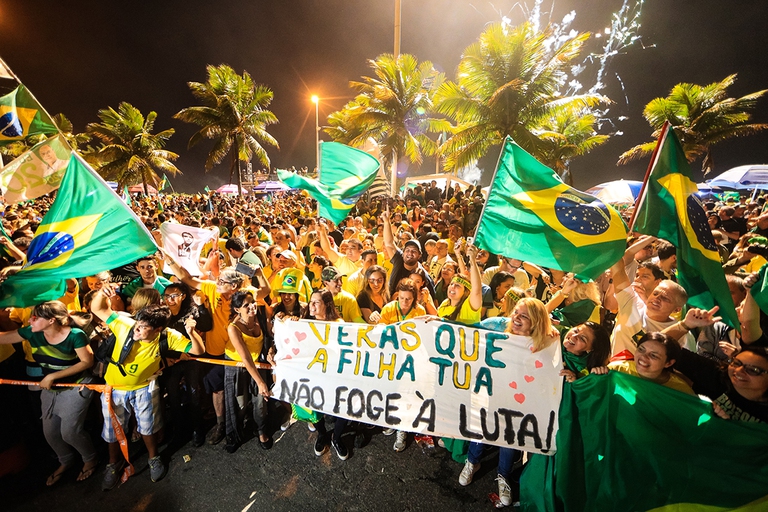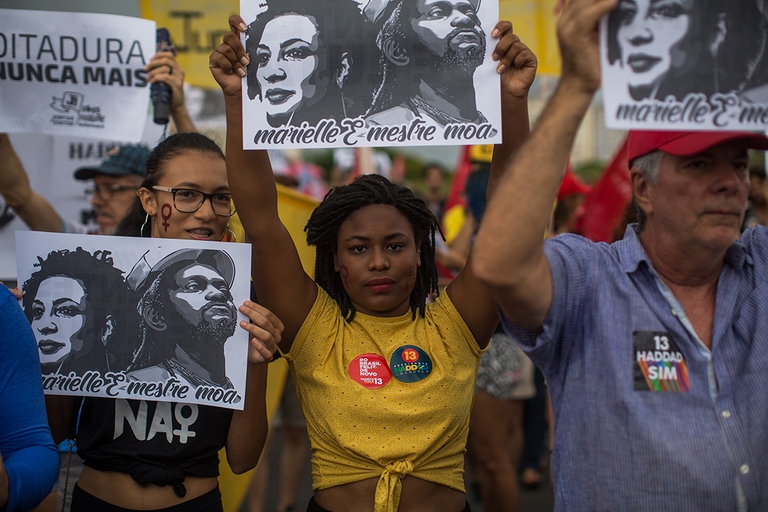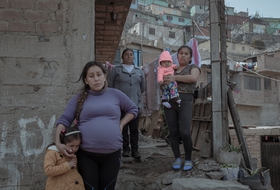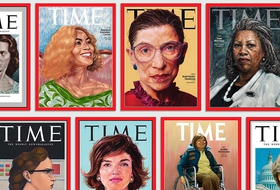
One in three women have suffered physical or sexual violence. With contributions from Europe, Africa, Asia and Latin America, we look at how this shadow pandemic affects every corner of the world.
Jair Bolsonaro is preparing to lead Brazil after his electoral triumph. We ask who he is, how he made his political career and what we can expect from his presidency.
The 2018 elections in Brazil had one indisputed protagonist: Jair Bolsonaro. After a slow start, following decades of political life as part of the opposition, the leader of the PSL (Partido Social Liberal, a nationalist and conservative party) gained consensus week after week, exceeding all expectations.
At the beginning of September, when he was already ahead in the polls, which predicted he would receive around 20 per cent of the vote, Bolsonaro was stabbed in the lower abdomen during a rally in Juiz de Fora, by a protestor who claimed to be a supporter of Lula. The candidate was forced to interrupt his campaign in order to receive emergency medical treatment for his injuries, but this didn’t have a negative effect on his popularity. Quite the contrary, in fact.
Demonstrations and marches against Bolsonaro, headed by the Ele Não (“Not Him”) movement, had little effect. In the first round of voting he won 46 per cent of the votes, a result that was confirmed in the run-off, where Bolsonaro triumphed over Fernando Haddad of the Partido dos Trabalhadores, gaining 55 per cent of the votes.
Jair Bolsonaro was born in the state of Sao Paolo in 1955. He has Italian ancestry, both on his father’s side (his great-grandfather Vittorio Bolzonaro emigrated to Brazil with his parents as a child) and on his mother’s side (his maternal grandparents were from Tuscany).
After attending a military academy he served in the artillery and parachute corps, and his military career actually ended quite early, never surpassing the rank of Captain. In the army Bolsonaro was known primarily for having led a movement to obtain better pay.
Having left the military, Bolsonaro began his political career. He was elected to Parliament in 1991 as a member of the Partido Democrata Cristão, and remained there for seven consecutive legislatures, running with different right-wing parties.
He is currently married to Michelle Reinaldo, whom he met while she was working as a clerk in the Chamber, and they have a daughter together, Laura. He had been married twice before, first to Rogéria Bolsonaro (the mother of his sons Flavio, Carlos and Eduardo, who are all currently working in politics) and then to Ana Cristina Siqueira Valle, with whom he had a child called Renan.
Bolsonaro had already gained notoriety in 1993, when he gave a speech in parliament in which he praised dictatorship: “We will never solve our serious national problems with this irresponsible democracy”. According to him, citizens themselves called for a return of the military regime.
Over almost three decades as a politician, he has put forth 171 legislative proposals, of which only two have been approved. Chico Alencar, a member of Congress elected in Bolsonaro’s district as a member of PSOL (Partido Socialismo e Liberdade), declared to the New York Times that for several years Bolsonaro was seen as an outsider, focused exclusively on a small number of issues, first among which was the fight against communism and LGBT rights. “I have never seen him participating in debates about the electricity grid, the environment, education, health, urban mobility, housing. He’s mono-thematic. Everything is about a communist threat. He hasn’t left the Cold War era yet”.
Read also: LGBT rights in Latin America, caught between progressive laws and widespread homophobia
In 2011 he came under scrutiny again for his opposition to the distribution of educational materials against homophobia, which he believed would confuse young people about their gender identity, thus promoting homosexuality. These extremely conservative positions, as is highlighted by the New York Times, have made him gain favour among the evangelist movements that have gained traction in Brazilian political discourse over the past few years.
According to the Times, Bolsonaro first announced his presidential ambitions to a small group of friends in 2013, and was initially met with skepticism. This did not discourage him. In 2014 he was elected to Congress with 464,000 votes, four times as many as he won in 2010. After this, he started to organise rallies up and down the country, presenting himself as an alternative to the old political system, using openly polemical and provocative language. At the same time, a massive investigation into corruption was shaking the foundations of Brazilian politics, decimating the leadership of the PT (Partito dos trabalhadores, Workers’ Party) and ending the careers of Lula and Dilma Rousseff.
As time went by, more and more of Bolsonaro’s supporters started to mimic his habit of making a gun gesture with his hand, alluding to his main promise against violence: to give police a licence to kill people suspected of criminal activities.
“There will be resistance, there will be opposition, there will be street mobilisations. Our voices will not be silenced”. These are the promises made by Guilherme Boulos, the PSOL (Partido Socialismo e Liberdade) candidate. “Bolsonaro won the election by exploiting people’s fears and their disillusionment with politics. But the fact that he won the election does not mean he owns the country”.
The extreme positions held by the President-elect of the largest South-American democracy have been recounted around the world over the past few weeks. But what can be expected, realistically, from Bolsonaro’s presidency? Dom Phillips, the Guardian’s correspondent, has highlighted the fact that so far there have been high-flown promises, but very few details.
For a country that is currently trying to recover from the worst economic recession in its history, the winning electoral manifesto promises growth, low inflation and new jobs. The most likely Minister of Finance is Paolo Guedes, co-founder of the BTG Pactual bank, a man with libertarian leanings who wants to push for the privatisation of state-run businesses (although Bolsonaro has already vetoed this for Petrobras and Eletrobras), for the revision of the costly pension system and the introduction of a twenty-year ceiling on spending.
In terms of security, a hot-topic issue given over 63,000 homicides last year, Bolsonaro has promised a hard line: liberalisation of gun ownership, chemical castration for rapists, immunity for police officers who kill criminals (5,144 people already died at the hands of law enforcement in 2017). However, even in these matters, details are scarce: it is not clear how he wants to fight drug trafficking, or whether there will be investment in technological innovation and investigative resources for the police force.
Read also: Brazil, Amazon reforestation at risk with Jair Bolsonaro’s election
Brazil will probably have to say goodbye to its Ministry for the Environment, which will be incorporated into the Ministry for Agriculture (where corporate lobbyists have great power). The promise of abandoning the Paris Agreement was recanted a few days before the vote, but the worries of environmentalists and the indigenous population are directed mostly at the Amazon basin. In the eyes of the President-elect, the reforestation efforts undergone in the past few years are a threat, because they exclude 136 million hectares from the state’s jurisdiction. “We’re on high alert”, Beto Marubo, the representative of the Vale do Javari reserve, said to The Guardian.
There is also great worry among the LGBT community: the situation is already dire, with 445 homicides in 2017 motivated by homophobia. After Bolsonaro’s first-round victory (who, incidentally, said in 2011 that he would rather see his son die in an accident than see him with a man with a moustache), threats to homosexuals and transsexuals greatly increased.
Bolsonaro has promised that the educational system will be purified from the “ideology” of the previous governments, favouring the teaching of science and technology, along with traditional family values. Also, the legacy of the military regime that led Brazil between 1964 and 1985 will be re-evaluated in a positive light, perhaps glossing over the over 400 murders of left-wing activists, and the thousands of instances of torture.
Siamo anche su WhatsApp. Segui il canale ufficiale LifeGate per restare aggiornata, aggiornato sulle ultime notizie e sulle nostre attività.
![]()
Quest'opera è distribuita con Licenza Creative Commons Attribuzione - Non commerciale - Non opere derivate 4.0 Internazionale.
One in three women have suffered physical or sexual violence. With contributions from Europe, Africa, Asia and Latin America, we look at how this shadow pandemic affects every corner of the world.
The Istanbul Convention against gender-based and domestic violence marks its tenth anniversary. We look at what it is, who its signatories are, and what the future might hold.
European Commission President Ursula von der Leyen reminded us of the gravity of violence against women around the world, and of the Istanbul Convention’s utmost importance.
President Erdoğan has pulled Turkey out of the Istanbul Convention, key in the fight against gender violence, claiming that it favours the LGBT community rather than family values.
Violence against women in Peru has increased as a result of Covid-19 lockdowns. 14,912 people were reported missing from January to November 2020, more than half of them minors and 64 per cent women. People have been confined to their homes for months, many forced to endure poor physical, economic and social conditions. A situation that
Joys Estefani Qqueccaño Huamani, 24, disappeared from her rural community in Peru on 9 October. Her family began looking for her independently of the authorities and despite the resistance of relatives of Joys Estefani’s ex-partner Arturo Ccana Condori, 32, charged with committing violence against her on 28 September, eleven days before Joys Estefani disappeared. Photos
Costa Rica celebrated its first same-sex marriage when two women, Alexandra Quiros and Dunia Araya, celebrated their wedding: an “extraordinary moment”.
The pandemic and its restrictions are affecting everyone, without exceptions. However factors like housing, income inequalities, gender, access to technology and working conditions are influencing how people experience the health crisis.
Time magazine’s 100 Women of the Year project sheds light on influential women’s stories, from Amelia Earhart to Greta Thunberg. A selection of some of the greats for International Women’s Day.









